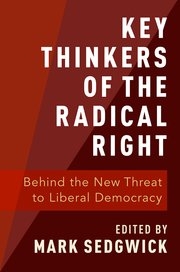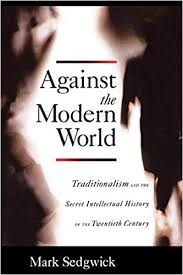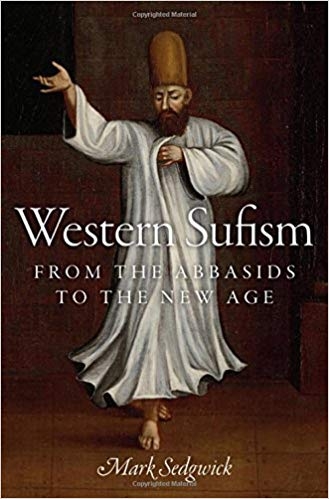Mark Sedgwick, ed.
Key Thinkers of the Radical Right: Behind the New Threat to Liberal Democracy
Oxford: Oxford University Press, 2019
 Mark Sedgwick is an English scholar of Western Esotericism and Islam. He is Professor of Arab and Islamic Studies at Aarhus University in Denmark. He is the author of six books, including Against the Modern World: Traditionalism and the Secret Intellectual History of the Twentieth Century (Oxford University Press, 2004), which I can highly recommend, and Western Sufism: From the Abbasids to the New Age (Oxford University Press, 2016).
Mark Sedgwick is an English scholar of Western Esotericism and Islam. He is Professor of Arab and Islamic Studies at Aarhus University in Denmark. He is the author of six books, including Against the Modern World: Traditionalism and the Secret Intellectual History of the Twentieth Century (Oxford University Press, 2004), which I can highly recommend, and Western Sufism: From the Abbasids to the New Age (Oxford University Press, 2016).
Given the overlap between Traditionalism and other Western Esoteric thought currents and the contemporary radical Right, Sedgwick’s decision to edit this volume makes perfect sense. One simply cannot study contemporary Western Esotericism without encountering and grappling with the far Right.
The book is divided into three parts: Classic Thinkers (Oswald Spengler, Ernst Jünger, Carl Schmitt, and Julius Evola), Modern Thinkers (Alain de Benoist, Guillaume Faye, Paul Gottfried, Patrick Buchanan, Jared Taylor, Alexander Dugin, and Bat Ye’or), and Emergent Thinkers (Mencius Moldbug, Greg Johnson, Richard Spencer, Jack Donovan, and Daniel Friberg).
I found the section on Classic Thinkers to be the best in the book. Each chapter is written by a highly accomplished scholar.
The Spengler chapter is written by David Engels, who has published books in French on historical decline and cycles.
The Jünger chapter is by Elliot Neaman, author of A Dubious Past, Ernst Jünger and the Politics of Literature after Nazism (University of California Press, 1999).
The Schmitt chapter is by Reinhard Mehring, author of the definitive 700-page doorstop Carl Schmitt: A Biography (Polity, 2014). I especially appreciate Mehring’s attention to Schmitt’s mystical and heretical religiosity. (In 1942, Schmitt told Mircea Eliade [2] that René Guénon is “the most interesting man alive today.”) This dimension of Schmitt’s thought is usually glossed over by biographers who simply refer to him as a Catholic thinker. (A very good recent book on Schmitt that foregrounds his heretical theological interests is Peter Uwe Hohendahl’s Perilous Futures: On Carl Schmitt’s Late Writings [Cornell University Press, 2018].)
The Evola chapter is by Thomas Hakl, author of Eranos: An Alternative Intellectual History of the Twentieth Century (McGill-Queen’s University Press, 2013).
My main quarrels with this section have to do with what it leaves out. There should be chapters on Nietzsche and Heidegger, and at the very least the Evola chapter should have dealt with Guénon as well.
Nietzsche had an immense influence on the entire Conservative Revolutionary movement in Germany, which included Spengler, Jünger, and Schmitt. He also influenced Evola, Benoist, Faye, Dugin, Donovan, Spencer, and me. There simply would not have been a modern radical Right without Nietzsche.
Heidegger was also influenced by Nietzsche and went on to influence Benoist, Faye, Dugin, and me. Indeed, I have argued that Heidegger’s project, beginning in the 1930s, of fashioning a post-nihilist, post-technological, post-totalitarian alternative to National Socialism was the outline of what we call the New Right today.
Guénon belongs because he did more than influence Evola. He is a distinct thinker who made his own impact on the interwar and post-war Right.
The section on Modern Thinkers is also quite informative. I don’t have any major quarrels with the chapters on Benoist, Faye, Gottfried, Buchanan, or Taylor.
I have read only two books by Dugin, but Marlene Laruelle’s essay on his certainly coincides with my impressions. Laruelle describes Dugin as “a chameleon thinker” who can “adapt his discourse to different publics” without commenting upon whether this is consistent with intellectual honesty or ideological consistency. She firmly debunks the idea that he is an influential member of the Kremlin inner circle.
 I cannot evaluate the accuracy of Sindre Bangstad’s chapter on “Bat Ye’or and Eurabia,” because I have never read Ye’or. But must note that this chapter has a carping and tendentious attitude that violates Sedgwick’s stated desire to maintain a neutral and scholarly tone. The running heads of the chapter also read “Bay Ye’or and Eurabia.”
I cannot evaluate the accuracy of Sindre Bangstad’s chapter on “Bat Ye’or and Eurabia,” because I have never read Ye’or. But must note that this chapter has a carping and tendentious attitude that violates Sedgwick’s stated desire to maintain a neutral and scholarly tone. The running heads of the chapter also read “Bay Ye’or and Eurabia.”
There are two major omissions in the Modern Thinkers section: Samuel Francis — who is an original thinker who influenced Gottfried, Buchanan, Taylor, Spencer, and me — and Kevin MacDonald, whose work on the Jewish question is single-handedly responsible for moving this topic from the margins to the center of contemporary far-Right discourse.
The section on Emergent Thinkers is the worst part of the book.
I can’t comment on Joshua Tait’s “Mencius Moldbug and Neoreaction” because I don’t recall ever finishing a Moldberg essay. I did, however, find Tate’s overview fascinating, although I was puzzled that he referred to Evola and Benoist as “irrationalist thinkers” (p. 188). (Is Tate an Objectivist?) I especially appreciated his point that “The overall effect of the language and style of [Moldbug’s] blog is of joining a conspiracy and entering a world of illicit knowledge” (p. 193). There is a definite neoreactionary mystique, and there is no question that such non-intellectual factors contribute to the success and influence of intellectual movements, at least initially.
Naturally, I am flattered that Graham Macklin’s chapter “Greg Johnson and Counter-Currents” was written and included in the book. The author has ably surveyed my works and hits a lot of the highlights. But he tries to paint me as more Old Right than New Right, which is really not accurate or fair, and flatly contradicts the whole tendency of my work, in which I take pains to differentiate my New Right metapolitical approach from Old Right politics. See, for instance, “New Right vs. Old Right [3]” and “The Relevance of the Old Right [4].”
Macklin and I seem to disagree on what differentiates the New Right and the Old Right. I see the distinction as primarily a matter of approach rather than doctrine. New Right and Old Right share a lot of the same political ideas, but they have very different approaches to actualizing them. The primary vehicle of the Old Right is the militant, hierarchical, totalitarian political party. The New Right’s primary vehicle is metapolitics: the transformation of culture to create a consensus supporting the ethnonationalism for all nations. As I conceive it, New Right metapolitics is also consistent with maintaining a large measure of democratic pluralism and respecting the human rights of all people.
Macklin wants to treat the Old Right and the New Right as bodies of ideas. He takes the European New Right as normative and points out my departures from it: my emphasis on race as a biological concept and the legitimacy of the Jewish question as revived by Kevin MacDonald. I am, of course, quite candid about these differences with the European New Right. But that does not alter in any way the fact that I embrace and advocate a New Right metapolitical approach to political change.
What’s more, I have always taken a New Right approach. This fact is implicit in some of the sources that Macklin cites, but I need to make it crystal clear.
I first took an intellectual interest in aspects of the Old Right within the context of scholarly debates about Heidegger. My outlook then as now was essentially (late) Heideggerian. Even in the 1990s, before the publication of Heidegger’s Black Notebooks, it was clear that Heidegger initially thought that National Socialism was an alternative to modern technological nihilism, but eventually he came to see it as just another expression of the same underlying worldview. For Heidegger, nihilism is basically having a false vision of man as being uprooted from nature and history and capable of controlling and consuming them.
The only way to avoid this trap is to move the battle from the political to the metapolitical plane. We need a fundamental transformation of our view of ourselves and our relationship to history and nature. But it is not as simple is manufacturing and promulgating a correct alternative worldview, for such a project itself is a form of technological nihilism. It assumes that the human mind and its machinations can stand behind culture and history and manufacture them according to its designs. Whereas the truth is that history and culture stand behind us. We are shaped by cultural and historical forces we can neither understand nor control.
But once we recognize this fact, i.e., that we are finite beings, rooted in a particular time and place, rather than rootless cosmopolitan citizens of nowhere, the spell of nihilism is broken, which clears a space in which a new dispensation — a new fundamental worldview — can emerge.
Thus Heideggerian metapolitics is not the construction of systems of ideas, ideologies, or -isms. Any worldview we can construct is simply an expression of nihilism, not an alternative to it. But that does not mean that we are impotent. We might not be able to manufacture an alternative, but we can still help one to emerge, first and foremost by owning up to our finitude and rootedness, then by clearing away the detritus of nihilism to create a space in which an alternative might grow.
 One can create political policies. One can create legal codes. One can build the damned wall. But it is not in our power to manufacture a new culture. But neither can we manufacture a simple tomato. We can, however, work with forces we ultimately do not understand or control — nature itself — to grow tomatoes. We can clear a space, plant a seed, weed, water, and fertilize — and then wait. We can do the same in the metapolitical realm: clear spaces by deconstructing false ideas, plant identitarian and ethnonationalist seeds, and tend what grows.
One can create political policies. One can create legal codes. One can build the damned wall. But it is not in our power to manufacture a new culture. But neither can we manufacture a simple tomato. We can, however, work with forces we ultimately do not understand or control — nature itself — to grow tomatoes. We can clear a space, plant a seed, weed, water, and fertilize — and then wait. We can do the same in the metapolitical realm: clear spaces by deconstructing false ideas, plant identitarian and ethnonationalist seeds, and tend what grows.
That’s what we do here at Counter-Currents. We help people envision new answers to the questions “Who are we?” “What is the right way to live together?” and “How can we get there from here?”
Heidegger did not believe that philosophers or poets are the hidden legislators of mankind, whose machinations create history. But that doesn’t mean we have to shut up and let history do the talking, or sit back and let history do the work. Rather, Heidegger believed that history speaks and acts through us. Philosophers and poets are the first people to become aware of fundamental changes in the Zeitgeist. Thus dissident thinkers and artists proceed historical change not as its creators but as its prophets, awakening and leading people to changes that are already underway. The very fact that we can conceive of fundamentally different ideas may mean that a new dispensation is nearing.
This is the larger context in which my intellectual work has to be placed. Because Macklin has a fuzzy understanding of this, he tends to treat my thinking as a grab bag of Old Right and New Right ideas. When he sent a draft of his chapter to me, I confess I did not think this was particularly problematic. But when I read Mark Sedgwick’s Editor’s Introduction, my blood pressure spiked at the sentence “Among contemporary thinkers of the radical right, only one of any importance (Greg Johnson) expresses any sympathy for Nazism” (p. xiv). This, mind you, is the Introduction to a book which contains a chapter on Richard “Hail Victory” Spencer.
When I asked Sedgwick what gave him this idea, he cited Macklin’s essay.
I have taken great pains to differentiate my New Right approach from the Old Right and to argue that neo-Nazism is a self-marginalizing and self-defeating ideology which, outside of Germany and Austria where it is illegal in any case, is also deeply inauthentic — a symptom of modern rootlessness, not an alternative to it. I hope that Sedgwick sees fit to change this highly misleading remark in the second edition of his book. (Honestly, I would be glad to cede my place in the volume to essays on more deserving figures like Nietzsche, Heidegger, Francis, and MacDonald.)
Tamir Bar-On’s chapter “Richard B. Spencer and the Alt Right” is by far the sloppiest production in the book, and it is also marred by tendentious editorializing.
- Francis Parker Yockey and Alexander Dugin are “European theorists.”
- Spencer is a “controversial star on the university lecture circuit.” He is “known for his numerous speaking engagements, especially to university audiences.” I can think of exactly six times that Spencer has spoken on university campuses since 2010. Even if we double the number, we don’t get “numerous” engagements or anything approaching stardom.
- Spencer is “owner” of Washinton Summit Publishers. (Really?)
- Spencer “hosts a weekly podcast called Vanguard Radio.” The present tense is a bit out of date.
- In 2014 “Spencer was deported from Budapest, Hungary.” Not just Budapest, all of Hungary, and not just Hungary, the whole Schengen Zone.
- “A key contributor on AltRight.com is Jared Taylor, the author of the seminal white nationalist tract White Identity . . .” I am sure Taylor would be quite surprised to know that he was a key contributor to AltRight.com. Perhaps Bar-On was confusing him with Vincent Law.
- “Spencer is married to Nina Kouprianova, who has translated numerous books written by Alexander Dugin. Those books have been published by Spencer’s Washington Summit Publishers.” “Numerous” meaning exactly one book, Martin Heidegger: The Philosophy of Another Beginning [5] (Radix, 2014).
- Spencer’s “major work” is his “Alt-Right Manifesto [6]” (it is neither major nor entirely Spencer’s work).
We learn that “blood and soil” is a “discredited” idea, that Spencer has an “obsession” with race and Jews, and that one aim of Spencer’s “Alt-Right Manifesto” and Unite the Right in Charlottesville is “to intimidate Jews, blacks Mexicans, and other minorities to leave the U.S.”
But Bar-On isn’t wrong about everything, noting for instance that “Spencer is more known for his YouTube videos, tweets, television and newspaper interviews, and university speaking engagements than for any substantive body of intellectual work” (p. 228).
 To top it off, the whole essay reads like a hastily assembled and barely edited draft, with occasional fragments of Yoda-like syntax.
To top it off, the whole essay reads like a hastily assembled and barely edited draft, with occasional fragments of Yoda-like syntax.
“Jack Donovan and Male Tribalism” by Matthew N. Lyons is a well-written and fair-minded overview of Donovan’s masculinist and tribalist ideas, including his one-time association with and subsequent estrangement from White Nationalists and the Alt Right. The essay is marred by a bizarre typesetting error in which the name of the tribal group to which Donovan belongs, the Wolves of Vinland is rendered “wolf of Vinland” at least eight times. This is frankly an embarrassment to Oxford University Press. They really should pull the current edition and reprint it. (Preferably with some edits to Mark Sedgwick’s Introduction as well — hint, hint.)
The last essay, Benjamin Teitelbaum’s “Daniel Friberg and Metapolitics in Action,” quite frankly strikes me as unethical. Teitelbaum is an American Jewish scholar of ethnomusicology and the far Right. He admits that he is a personal friend of Friberg: “I have dined, drunk, and lived with him” (p. 260). But even if he had not mentioned it, it would have been obvious to any reader. Unlike every other chapter in the book, his essay reads like a puff piece.
Indeed, some of it seems to have been written by Friberg himself. Sentences like the following definitely have his bombastic self-promotional touch:
- “He had assembled a media, literature, and music empire whose expansion seemed exponential . . .” (p. 259)
- “Though rooted in the thinking of neo-Marxist Antonio Gramsci, metapolitics as a theorized concept entered the radical Right via the French New Right. Daniel Friberg, however, emerged as its foremost strategist and implementer.” (p. 260)
- “If you study an anti-immigrant political party, militant organization, think tank, retail outlet, or festival in 1990s or early 2000s in Sweden you are likely to find [Friberg’s] hand in it, and projects for which he was centrally responsible later became mainstays for radical rightists throughout the globe.” (p. 259)
No mention is made, however, of Friberg’s typical departures from these projects under clouds of recriminations about embezzlement, sabotage, doxing, and suspicious contacts with police and antifa. Of course one would not expect Friberg to mention such things, but perhaps an objective scholar would. There is no point in listing all of Teitelbaum’s factual errors, most of which are highly flattering to Friberg. He obviously believed everything that Friberg told him and did not bother to check any of his assertions.
I have no doubt that most of the essays in Sedgwick’s collection would have turned out rather differently if they had been written by personal friends of the subjects, not to mention ghost-written by the subjects themselves. But then the book would have forfeited even the pretense of objectivity, and I doubt very much that Oxford would have chosen to publish it. Frankly, this essay is a carbuncle on the whole project, and Sedgwick should not have included it.
Key Thinkers of the Radical Right is flawed in conception and botched in production. But it does contain a number of excellent essays, and its very existence is a further sign that New Right, White Nationalist, and National Populist ideas are now being taken seriously enough to merit the attention of academic scholars. (Lyons is merely an antifa researcher, but at least he’s well-behaved.) Let’s hope that there is sufficient demand for a new edition so that some of its more egregious flaws can be remedied.





 del.icio.us
del.icio.us
 Digg
Digg
Les commentaires sont fermés.